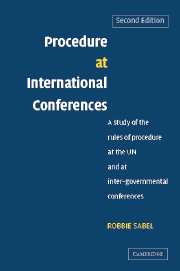 Procedure at International Conferences
Procedure at International Conferences Book contents
- Frontmatter
- Contents
- Preface to the second edition
- List of abbreviations and conference references
- Introduction
- 1 Historical development of rules of procedure of conferences and attempts to establish model rules
- 2 Adoption of rules of procedure
- 3 Rules of procedure and international law
- 4 Invitations, participation and credentials
- 5 Presiding officer and other officers of the conference
- 6 Meetings
- 7 Statements by delegations
- 8 Submission of proposals
- 9 Adjournment and closure of debate
- 10 Amendments
- 11 Withdrawal and reconsideration of motions
- 12 Procedural motions and points of order
- 13 Priorities between different proposals
- 14 Decision taking and method of voting
- 15 Majority required
- 16 Consensus
- 17 Separate votes
- 18 Conduct of voting – interruption of voting and correction of vote
- 19 Languages, records and documents
- 20 Committees
- 21 Suspension and amendment of rules of procedure
- Bibliography
- Index
12 - Procedural motions and points of order
Published online by Cambridge University Press: 22 July 2009
- Frontmatter
- Contents
- Preface to the second edition
- List of abbreviations and conference references
- Introduction
- 1 Historical development of rules of procedure of conferences and attempts to establish model rules
- 2 Adoption of rules of procedure
- 3 Rules of procedure and international law
- 4 Invitations, participation and credentials
- 5 Presiding officer and other officers of the conference
- 6 Meetings
- 7 Statements by delegations
- 8 Submission of proposals
- 9 Adjournment and closure of debate
- 10 Amendments
- 11 Withdrawal and reconsideration of motions
- 12 Procedural motions and points of order
- 13 Priorities between different proposals
- 14 Decision taking and method of voting
- 15 Majority required
- 16 Consensus
- 17 Separate votes
- 18 Conduct of voting – interruption of voting and correction of vote
- 19 Languages, records and documents
- 20 Committees
- 21 Suspension and amendment of rules of procedure
- Bibliography
- Index
Summary
Procedural motions
Definition of a procedural motion
A definition, necessarily circular, of a procedural motion is that it is a request by a delegation for the conference or assembly to decide on an issue of procedure. There is no exhaustive list of what issues constitute issues of procedure.
Examples of procedural motions are motions to:
Suspend a meeting
Adjourn a meeting
Adjourn a debate
Close a debate
Reconsider a proposal
Divide a proposal for purposes of voting
Refrain from taking a decision
Decide the order of voting on proposals
Decide whether to vote on the next proposal where a previous proposal related to the same question
Challenge the ruling of a presiding officer on a point of order
Ask for an opinion of the President, the Secretary-General or the Legal Adviser of the Conference
Suspend the rules of procedure.
At a 1966 meeting of the UNGA, a discussion took place about whether the rule as to reconsideration applied to procedural proposals. The US representative argued that: ‘The rules of procedure did not make a distinction between substantive and non-substantive proposals. They did distinguish between proposals, on the one hand, and motions of a particular character, such as those mentioned in rules, 117, 120 and 122, on the other.’
The statement of the US representative was correct regarding the UNGA. There are however rules of procedure of conferences and organisations that explicitly distinguish, for purposes of the majority required, between substantive and procedural issues.
- Type
- Chapter
- Information
- Procedure at International ConferencesA Study of the Rules of Procedure at the UN and at Inter-governmental Conferences, pp. 245 - 262Publisher: Cambridge University PressPrint publication year: 2006


